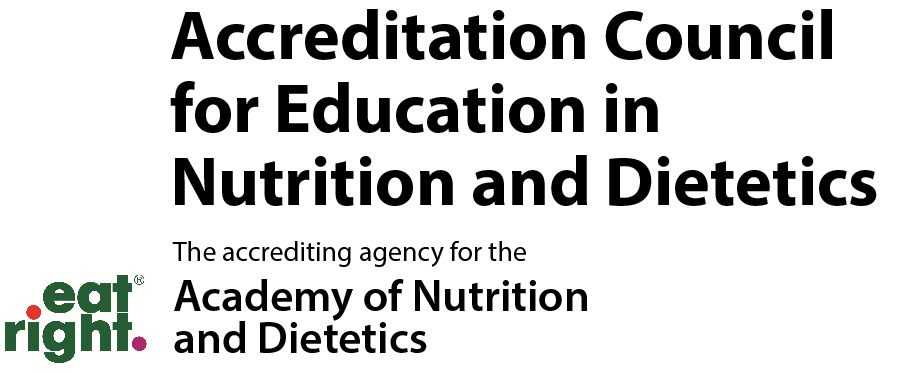Our Mission
To integrate graduate education and research with supervised practice to prepare entry-level dietitians with
advanced nutrition knowledge and clinical skills to benefit the nutrition and health
status of individuals and
communities.
Program Goals
#1 - The Dietetic Internship program will prepare graduates to be competent entry-level practitioners in the field of nutrition and dietetics.
Objectives:
- 1.1 At least 80% of program interns complete program/degree requirements within 33 months (150% of program length).
- 1.2 Of graduates who seek employment, 75% are employed in nutrition and dietetics or related fields within 12 months of graduation.
- 1.3 90% of program graduates take the CDR credentialing exam for dietitian nutritionist within 12 months of program completion.
- 1.4 The program's one year pass rate (graduates who pass the registration exam within one year of first attempt) on the CDR credentialing exam for dietitian nutritionist is at least 80%.
- 1.5 At least 90% of responding employers will rate entry-level performance of program graduates as "3=adequately skilled" or "4=highly skilled" on employer survey (based on 4 point scale).
- 1.6 100% of students respond that they feel prepared to accept a position with primary responsibility being clinical nutrition on exit interview evaluation.
- 1.7 At least 80% of graduate responses will indicate scores of “3=more than adequate” or “2=adequate” on survey question related to preparation for entry-level positions in dietetics, with primary responsibility being clinical nutrition on a one year post graduation survey.
#2 - The Dietetic Internship program will prepare graduates to develop research skills and foster an evidence-based approach to the practice of clinical dietetics.
Objectives:
- 2.1 100% of students will incorporate evidence-based knowledge into their academic assignments.
- 2.2 100% of students will successfully complete an evidence based clinical case study during their internship with a score of 4 or better with 4=capable for entry-level dietetics.
- 2.3 At least 80% of responding employers will rate program graduates as “3=adequately skilled” or “4=highly skilled” on the question incorporates evidence-based knowledge into practice on employer survey (based on 4 point scale).
The mission, goals, and objectives are continually monitored for program effectiveness.
Program outcomes data are available on request.
Accreditation
East Tennessee State University is accredited by the Southern Association of Colleges
and Schools Commission on Colleges (SACSCOC) to award baccalaureate, master’s, education
specialist, and doctoral degrees. East Tennessee State University also may offer credentials
such as certificates and diplomas at approved degree levels. Questions about the accreditation
of East Tennessee State University may be directed in writing to the Southern Association
of Colleges and Schools Commission on Colleges at 1866 Southern Lane, Decatur, GA
30033-4097, by calling (404) 679-4500, or by using information available on SACSCOC's
website (www.sacscoc.org).
 1866 Southern Lane
1866 Southern Lane
Decatur, Georgia
Phone: (404) 679-4500 ext. 4504
The dietetic internship program was granted full accreditation by the Accreditation
Council for Education in Nutrition and Dietetics (ACEND) of the Academy of Nutrition
and Dietetics,
120 S. Riverside Plaza, Suite 2000, Chicago, IL 60606-6995
Phone: (800) 877-1600, ext. 5400.
Equal Opportunity
East Tennessee State University is an AA/EEO employer and does not discriminate on the basis of race, color, national origin, veteran status, sex, disability, or age in its programs and activities.
